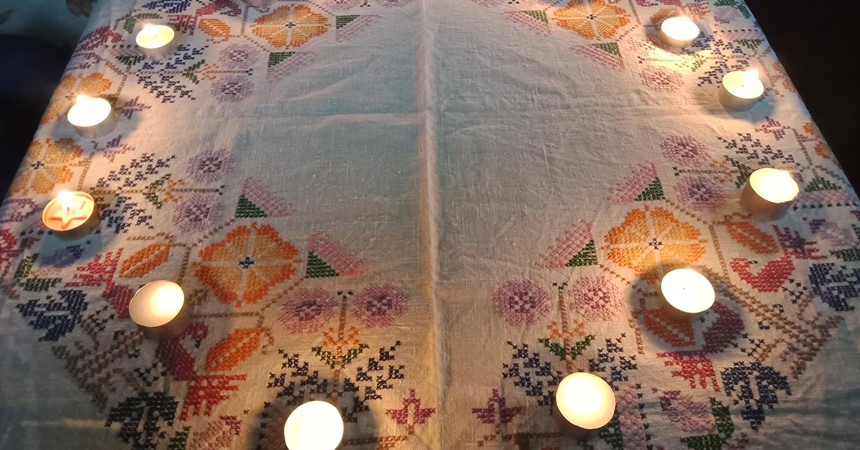Three more recent experiences have been echoing in my mind and heart these days. At the last formation session Fr Andrew Doohan and I facilitated with the Assistant Masters of Ceremonies, literally on the day everything closed, we reflected on how we would sustain our faith and ministry without the public celebration of the liturgy. One member replied, with these or similar words, ‘Well it will be up to me to sustain my prayer life. Instead of relying on Sunday Mass so much, I will have to be more personally responsible to pray and to find my own rhythm of daily and weekly prayer.’
The second experience is from the last real meeting of the Diocesan Liturgy Council when we were discussing the directives and the pastoral and prayer support that could be provided to this local Church with the cessation of public liturgy. One member of the Council said, again using these or similar words, ‘This is a great opportunity for us to pray as a family – all of us – even those who don’t go to Mass can join in!’ The image accompanying this reflection is of the symbol her family created to pray the Stations of the Cross on Good Friday. The tablecloth features her Grandmother’s cross stitch. That tablecloth is a sacrament for this family.
Thirdly, a friend who is a priest has been working behind the scenes to enable the live streaming of our liturgies. I asked him how he was feeling, not being able to participate in the liturgy as he normally would, especially over Easter. The word he used was ‘bereft’. The lay faithful are bereft in their hunger for the bread of life and the cup of salvation. Perhaps all the clergy are ‘bereft’ presiding without the people present. Empty pews, hollow responses. That can’t feel good. It can’t feel right within the context of our current understanding of who we are as church and the nature and purpose of liturgy. Hopefully the various ways we are all feeling ‘bereft’ will enable us to empathise with each other in the midst of the new gulf between those who continue to be fed and those who hunger.
So … what is God revealing to us in this COVID 19 experience, and into what new life is the Spirit of the risen one leading us? Amongst many things, I am wondering about the following:
When we are able to gather again for Sunday Eucharist, will our participation as members of ‘team Assembly’ be more full, conscious and active because individually we have expanded and deepened the daily and weekly rhythm of our prayer life? There are many resources to support the prayer of the domestic church on our website. To harken back to wise old Manny, ‘The team is only as good and strong as its individual members!’
Will this enriched personal and family prayer life free our Sunday Mass from having to bear the weight of all our prayer expectations so that it can become what it is meant to be, the source and summit, rather than all there is? And will we grow beyond Mass being the ‘go to’ liturgy for everything?
Will our celebration of the ‘Liturgy of the Word’ – both within and outside Mass – be more meaningful, because in the absence of eucharist, we have turned to the Word and deepened our capacity to dwell there with God? To sit like disciples and listen?
Will our domestic churches grow in strength, ‘waking up’ to a richer, broader, deeper understanding of sacrament? What are the everyday sacraments in your home? Through the Easter Ceremonies we remember the ‘Last Supper’. ‘Last’ is an important word. Jesus participated in many suppers, many meals. How is the sacrament of family meals drawing our minds and hearts to the presence of God with us and amongst us? How is our unity in Christ being strengthened around jigsaw puzzles, board games, Netflix, walks, bike rides, care of neighbours? God’s presence is larger than Mass. And in this wonderful liturgy of life are we becoming more conscious that we are sacraments of God’s love and that the very point of the church’s sacramental life is to make us so?
This liturgy of life, the praise and thanks we offer God in daily life, is what we bring to Mass every Sunday and offer to God through Jesus and in the Spirit: the ‘fruit of the earth and work of human hands’. In turn we are sent from Mass transformed, to once again engage in the liturgy of life. The liturgy of life is the point of the public liturgy of the church. There is a continuity here that our current circumstances have the potential to strengthen.
Are we feeling ‘bereft’ because we do not have access to full, conscious and active participation in the eucharist? Is our longing for eucharist deepening? Or is this longing being masked with live-streamed Masses? Our loss is critical. It is also critical that we are aware of it, feel it, and open ourselves to the presence of God and the movement of the Spirit in this experience of loss. ‘Bereft’ is a good word.
If liturgy as the full public worship of the church is to really matter, if it is to really transform us so that the mission of Christ continues in the world through us, then the domestic church must matter, and the liturgy of life must matter. In his homilies over the Triduum Bishop Bill talked about our being ‘the people who …’ in shorthand, respond to these circumstances as Christ. Every news report shows that this is an urgent need, especially in supermarkets!
It is good to remember that God is present in the domestic church and the liturgy of life, building and strengthening these key elements of Christian life through circumstances not of our own choosing. God’s ways are always beyond our ways. And so I need to ‘listen like a disciple’ to ensure that I live like one.

